October 16, 2012 01:32 PM
Successful in Singapore, Ramen Champion goes global.
Commerce Group CEO Mr. Koki Matsuda[Japan]
By Masaaki Yasuda Interviewed on May 16, 2012
Keywords : Commerce Food theme park Hong Kong Ramen Ramen Champion
Japanese Ramen is booming in Singapore at the moment. Many young locals are queuing up at Ramen restaurants to get in. Amongst many Ramen restaurants, Ramen Champion, which opened in July 2011 at the shopping mall iluma (currently named as "Bugis+") is making a major splash. It is a food theme park where six Ramen restaurants compete against each other for the best Ramen. In December, a second outlet was opened at Changi Airport. The organizer is a Singapore-based company, Commerce Group. Mr. Matsuda, CEO of Commerce Group has a vision to expand globally.
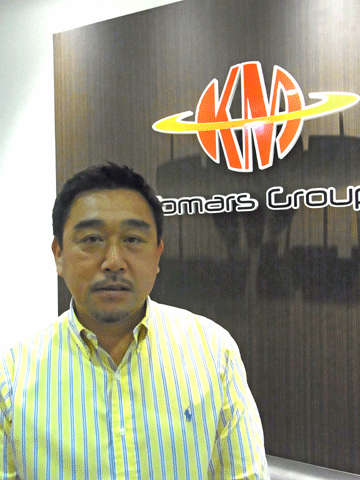

Mr. Koki Matsuda.
Commerce Group operates 20 restaurants such as Japanese cuisine and Ramen restaurants in Singapore and Thailand. The company also has 65 outlets of various businesses such as the 10 minute 10 dollars hair salon "EC HOUSE", and hair removal esthetic salon "Regina" in Singapore, Malaysia, Thailand and Hong Kong.
"I was born in Sapporo, and after graduating from High school I went abroad and since then 30 years have passed by. I was in US for 13 years. While going to Junior College I worked part-time at a Japanese restaurant. At the time, Sushi was booming in US. It all started in Little Tokyo, and then many Sushi restaurants started to open in suburban areas which all of them did well. After graduating, my friend and I gathered some money and opened a Japanese restaurant. It was successful but we could not manage it well. When more competitors came about, I decided to quit and handed over the business to my friend. At the time, the economy in US was not doing well due to the Gulf War. I thought to myself, it is going to be the Asian era from now on and decided to relocate to Singapore. My friend who continued the business became very successful and now operates 10 outlets in US", said Mr. Matsuda.
"I came to Singapore in 1994. Although I have visited various countries in Asia, I found it easy to live here because people understood English. First, I opened a Japanese restaurant, which was a field I was experienced in. I survived but it was a struggle. The initial investment to open a restaurant is high. So I began to search for other business opportunities where I can open many outlets with less hassle and commitments. I found a business called QB HOUSE, a hair salon with a service of 10 minute 1000 yen per hair cut. I visited their main office and suggested to expand into Singapore together. However, they did not agree to make any capital contributions. So, I came up with the capital and started the business. The first outlet was a success with 200 customers per day. Shortly after, QB HOUSE decided to open their outlets wholly owned by their company in Singapore as well. Therefore, I stop using the QB HOUSE brand name and started my own brand, EC HOUSE.", continued Mr. Matsuda.
In May 2009, Mr. Matsuda conceptualized and opened a Japanese food court "Ebisuboshi Shotengai" at the then newly opened shopping mall, iluma. He gathered seven Japanese F&B companies such as Hokkaido's-own izakaya F&B chain "Tsubohachi", restaurants specializing in shabu shabu, tonkatsu, Hokkaido Ramen, Hiroshima-style Okonomiyaki, Sushi, and Japanese sweets to join in this 9000sq.ft business concept.
"Ramen Champion" came about as a revamped concept of this business in July 2011. It shifted the concept of an all-around Japanese food court to a more focused theme - Ramen. Leaving Hokkaido's izakaya "Tsubohachi" in place, which Commerce Group holds a Franchise Chain expansion rights within Singapore, six Ramen restaurants such as "Menya Iroha" (Toyama), "Gantetsu" (Hokkaido), "Hakata Ikkosha" (Fukuoka), "Ramen Bario" (Tokyo), "Tsukemen TETSU" (Tokyo) and "Taishoken" (Tokyo) opened its stalls within the premises.
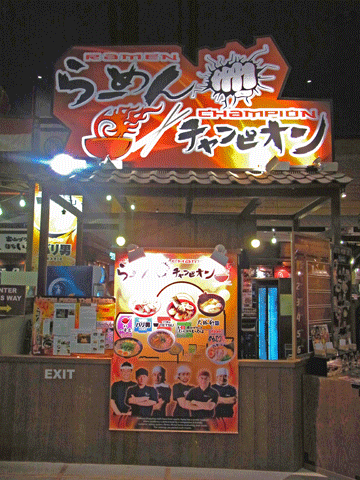
Entrance "Ramen Champion".
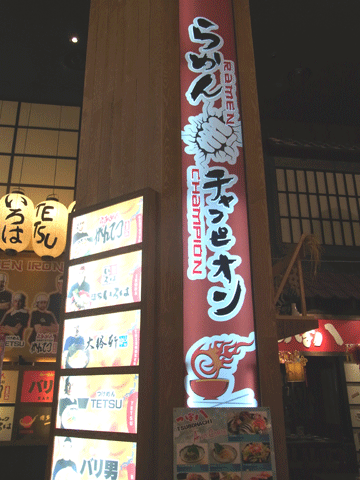
Fancy climbing is a sign.
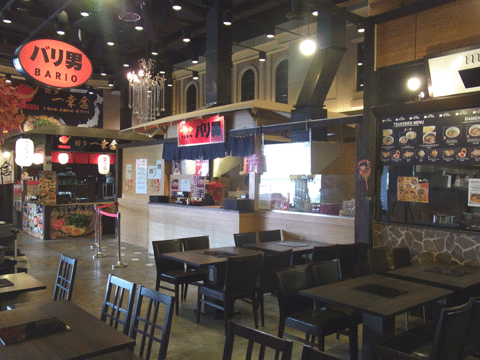
Store interior.
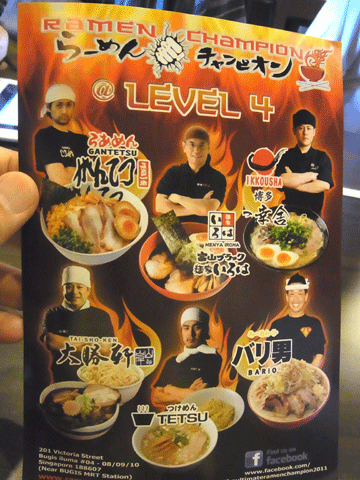
Flyer.
In December, the second outlet was opened at Changi Airport. It consists of four stalls; "Gantetsu" (Hokkaido), "Hakata Ikkosha" (Fukuoka), "Hakata Gensuke" (Fukuoka) and "Riki" (Tokyo).
It is not merely a food court, but a food theme park where an ongoing competition between the stalls are being held. A combined popularity ranking of the two outlets, iluma and Changi airport, is announced every three months. The popularity is calculated from the overall outcome of its internet voting system, sales and number of "likes" on their Facebook page. Payments are not made at each stall when you order your Ramen, but customers receive a card when entering the food court, and the stalls charge the amount on it when orders are placed. Payments will be made on the way out. There is no entry fee or service charge.
"Due to the frequent mall renovations the developers of iluma have been conducting recently, we only had about six months of a "normal" business environment, but still we managed to generate 50 million yen(S$780thousand) worth of sales each month. Although the sales vary between stalls every month, none have ended in red.", said Mr. Matsuda.
"90 percent of the customers are locals, and the rest are tourists. Male-female ratio is fifty-fifty and the majority being young people. The crowd on weekends is amazing which assures me that Ramen is still "in". The beginning of the Ramen craze started when "Marutama Ramen", known for its chicken broth soup, opened at the shopping mall Central in February 2008. There was a long queue of customers waiting to get in. So, we opened "Bishamon" immediately after to cash in on the wave. Followed by other Ramen restaurants such as 'Santoka' and 'Ippudo'."

Singapore popular with young people.
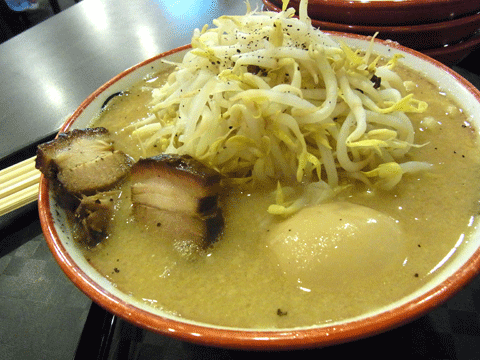
Ramen Man "Bali" the most popular. Gattsuri system.
Despite of the Ramen craze, the reality is not so simple for new restaurants to come in the market. Lack of vacant restaurant space and strict employment visa requirements are making it difficult for them to open restaurants here. So, the concept of Ramen Champion was a simple but viable solution for this. A third outlet is confirmed to be open at a shopping mall in the west area Jurong, which is expected to be opened next year.
Also, it is confirmed that they will be expanding into the Hong Kong market this September. Followed by Jakarta and Shanghai. Then hopefully to New York, Taiwan, Bangkok, Beijing, Los Angeles, Moscow, London and Paris. In order to bring this plan to life, it is essential to secure participating restaurants, and so, Mr. Matsuda is continuously calling for Japanese Ramen restaurants to join in the boat.
"Commerce Group will bear all costs of space rental security deposits, kitchen, and construction. Participating restaurants just need to chip in their human resource and know-how."
Commerce Group will also take the duty of paying the salary of the cook sent from Japan (1 person per stall), GST and other taxes on behalf of the participating restaurants. 7 percent of the sales will be collected as a management fee which includes advertisement fee. The operating profit generated from each stall is divided so that 70 percent goes to Commerce Group, and 30 percent to the stall owner. A bigger portion of the profit goes to Commerce Group due to the higher risk the company takes upon. Each restaurant is required to incorporate their company in Singapore, so basically, the only cost they need to bear is their incorporation expenses.
"A few hundred million yen worth of investment is needed to open one outlet. We will be getting some capital from a government-related venture capital firm and will be incorporating a venture company with a vision to go public in the near future. The first outlet (managed by the new venture company) will be opened in Hong Kong and will be the platform for our future global expansion. The interior design will be different from the outlets in Singapore, which are designed to replicate the good old days of the 50s and 60s of Japan, and will look more stylish. In each country we expand into, we will be incorporating a venture company with a local company as our partner to carry out the operations. By the way, our local partner in Los Angeles is my friend who I once opened a Japanese restaurant with."
"We are in the same boat with our participating Ramen restaurants. Our vision is to be listed, and that is why we want to open many more outlets. Our plan is to invite our participants to be shareholders as well so they can benefit from it too. Also, we hope that they gain enough popularity so that they can independently expand within the market. We will support them."
"The public has a fascination with Japanese food. They consider it as healthy and safe. The young generation is becoming more health-conscious such as regarding spicy food as harmful for the brain. Ramen as well, is regarded healthy just because it is from Japan", laughs Mr. Matsuda.
"The once-popular Sushi has dropped its reputation from a prestigious luxury food to an easy-to-go kaiten-zushi (revolving sushi bar). Ramen is the opposite. More people are being more educated about Ramen. We hope many more of such people will appear and promote Ramen. Nowadays, things do not become popular merely by being seen on TV. Word-of mouth is much more powerful. It goes something like 'others are talking about it,' or 'others are eating it, so I will too'. We also hope to do activities to cultivate Ramen 'maniacs'."
Although Ramen is becoming more and more popular overseas, it is still only in the major cities. Ramen Champion's role is to further penetrate the Ramen craze broadly around the world. There is a similar business called "Ramen Champions" (opened in November 2010) in Bangkok, Thailand, however this is not done by Commerce Group. That was conceptualized by Mr. Tan Passakornnatee, former president and creator of the Japanese chain restaurant OISHI Group, who was the trend-setter of the Japanese food craze in Thailand.





